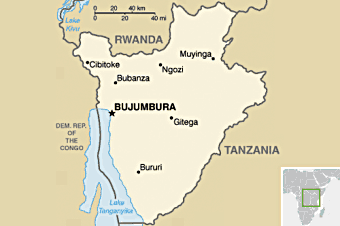
Geneva, 16 September 2011 - The Republic of Burundi will next week accelerate its fight against pneumonia, the world's biggest killer of children under five, when it becomes the tenth African country to introduce new pneumococcal vaccines.
Every year, an estimated 16,000 children in Burundi die from pneumococcal disease, the main cause of pneumonia.
Preventable through vaccine
"Pneumonia is still killing too many of our children, but with this new vaccine we aim to reverse this tragedy and set our children on course for a healthy future," said Dr Sabine Ntakarutimana, Burundi's Minister of Health.
Globally, more than half a million children die every year from pneumococcal disease. An estimated 90% of these deaths occur in the developing world and the deaths are especially tragic because pneumococcal disease is preventable through vaccination.
By 2015, the GAVI Alliance (the Global Alliance for Vaccines and Immunisation) plans to have supported the introduction of these vaccines in more than 40 developing countries. Burundi will be the fourteenth developing country to introduce the vaccine with GAVI support.
"The introduction of pneumococcal vaccines into Burundi is a solid long-term investment for the country's social and economic potential," said GAVI Alliance CEO, Dr Seth Berkley. Today is a great day for the children of Burundi. GAVI's support for pneumococcal vaccine means that children can get this powerful cost-effective vaccine wherever they live".
|
Pneumonia is still killing too many of our children, but with this new vaccine we aim to reverse this tragedy and set our children on course for a healthy future. Dr Sabine Ntakarutimana, Burundi's Minister of Health |
Cost-effective solution
As well as preventing premature death, the use of vaccines also reduces the number of clinic visits, hospitalisations and permanent disability. Parents are able to spend less money on treatment for sick children and have more time for productive work.
In recent months, the Central African Republic, Gambia, Cameroon, Benin and Rwanda have also introduced the new pneumococcal vaccine. This means that since it was first introduced in Nicaragua in December 2010, a total of 14 developing countries will have introduced the pneumococcal vaccine into their routine immunisation programmes with support from the GAVI Alliance.
AMC
The roll-out of the pneumococcal vaccines in countries such as Burundi has been made possible through an innovative finance mechanism pioneered by GAVI called the Advance Market Commitment (AMC) .
With US$ 1.5 billion from Italy, the United Kingdom, Canada, the Russian Federation, Norway, and the Bill & Melinda Gates Foundation and a commitment of US$ 1.3 billion from GAVI, the AMC allowed the acceleration of production capacity by the two manufacturers who currently produce the vaccines.
Without the AMC, it might have taken up to 15 years for appropriate pneumococcal vaccines to reach the developing world.
Pneumococcal vaccines, once fully rolled out globally, are expected to save seven million lives by 2030.
